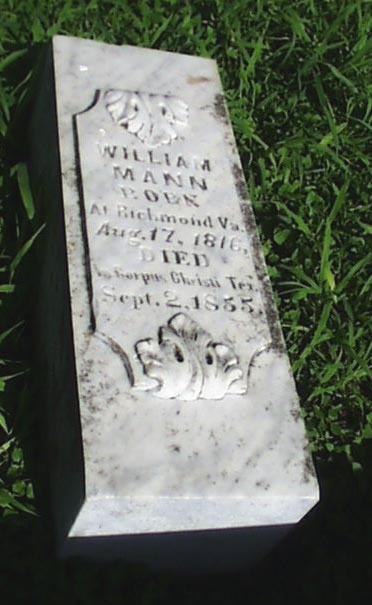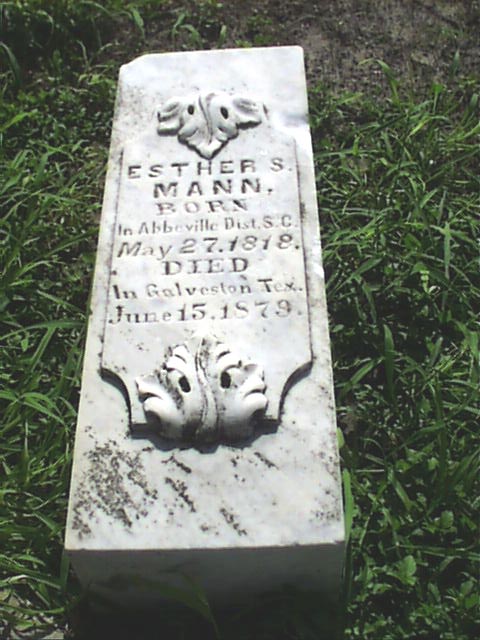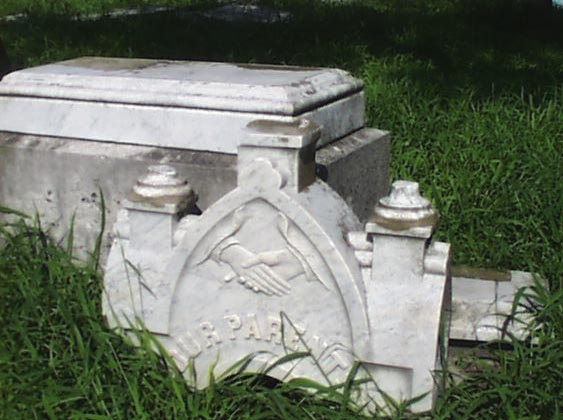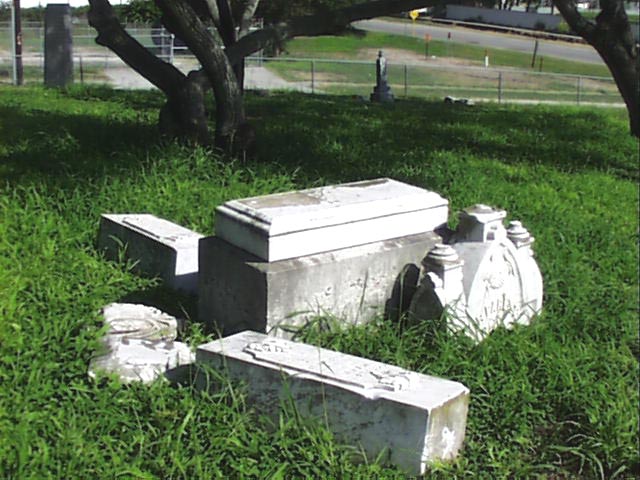William Mann
Born
at Richmond, Va
Aug. 17, 1816
Died
in Corpus Christi, Tex.
Sep. 2, 1855
Mann
Born
in Abbeville Dist. S.C.
May 27, 1818
Died
in Galveston, Tex.
June 15, 1879




Photo Credit: Rosa G. Gonzales
1. Corpus Christi History by Murphy Givens
Corpus Christi Caller Times (February 29, 2000). Available on microfilm.
2. Corpus Christi History by Murphy Givens
Corpus Christi Caller Times (May 31, 2000). Available on microfilm.
3. Corpus Christi History by Murphy Givens
Corpus Christi Caller Times (November 1, 2000). Available on microfilm.
4. Corpus Christi History by Murphy Givens
Corpus Christi Caller Times (January 17, 2003).
5. Corpus Christi History by Murphy Givens
Corpus Christi Caller Times (March 7, 2003).
6. Corpus Christi History by Murphy Givens
Corpus Christi Caller Times (August 22, 2007).
7. "Slavery: An Untold Story," by Ellen Bernstein
Corpus Christi Caller Times (February 29, 2000). Available on microfilm.
8. Photograph of earlier condition of headstone
Provenance: From the Collection of the
Corpus Christi Museum of Science and History
Submitted by: Pat Murphy
9. Research by Frank Wagner
MANN, WILLIAM, b. 17 August 1816 at Richmond, Virginia, d. 2 September 1855 at Corpus Christi. 1 Mann learned the art of sailing at Norfolk and was master of a small schooner trading along the Carolina coast. He met his wife, Esther, at Charleston, and they were married in 1836. Of the union, Virginia was born in 1837, Walter in 1838, William in 1840, Louisa in 1842, John in 1844, Josephine in 1846, and Henry Kinney in 1848. Esther Mann survived her husband until 15 June 1879 when she died in Galveston.2 Mann was elected a county commissioner in 1846 and 1849 for Nueces County,3 and was involved in much land speculation and economic development for the Corpus Christi region. He was one of the incorporators of the Corpus Christi Navigation Company, which was intended to dredge a deepwater channel across Corpus Christi Bay to the city of Corpus Christi.4 Esther Mann administered her husband's large estate through the Civil War and during Reconstruction. After her death, her son Henry Kinney Mann, administered the residue of the property. Mann's son, Walter, was an officer in the Confederate forces during the Civil War and was often mentioned in dispatches.
Research by: Frank Wagner
Transcription by: Rosa G. Gonzales
1. Grave marker, Old Bayview Cemetery, Corpus Christi, Texas.
2. Census Schedules for Nueces County, Texas, Texas, 1850.
3. Nueces County Probate Minutes, Commissioner's Court, Book A.
4. Texas State Gazette, 1 May 1852, p. 292, "An act to incorporate the Corpus Christi Navigation Company" (Approved 16 Feb. 1852.)
10. Grocery bill issued with signature
Provenance: Mrs. Willie Lee Biggio Jones and Rebecca Lee Jones
11. Biographical information
CORPUS CHRISTI, now often known as the Bluff City on account of the high table-land back of its terminating in a steep bluff, and extending to within a short distance of Corpus Christi bay, on which a great portion of the city and by far the greater part of the dwelling houses and the tasteful and handsome residences of the opulent citizens are erected, was at the time of which I write nothing more than a small village. On the bluff, or on the hill, as the people of Corpus designate this high plat or table-land, there was not more than two or three frame buildings and a few Mexican jacals, or shanties; the lower or business part of the town consisted of two or three stores, the largest by far being the red brick store owned by Mr. William Mann, and of the others one was kept by T. B. Belden and H. Gilpin and the other by Warren Kinney. The place at that time was as often called Kinney's ranch, or by the Mexicans, at rancho del Colonel, as by the appellation which it now bears. The city is picturesquely and pleasantly situated at the mouth of the Nueces river, which is to the north of it, and on the margin of Corpus Christi bay, which is its eastern boundary. The Hat or Rincon, as it used to be called, and is yet sometimes, though it also boasts of the high-sounding title of Brooklyn, bestowed upon it by Mr. Ohler, who laid off a town there and built two or three houses, is a small sandy peninsula lying between the town of Corpus Christi and what is known as the reef, at the mount of the Nueces, where that river mingles its waters with the bay. The reef is fordable at nearly all times, and is the pass-way from Corpus to Ingleside and the country north of the lower Nueces. It is about three miles across from shore to shore, and is as crooked as a Virginia worm fence or a ram's horn.
Source:
"Reminiscences of J. William Moses." Published in the San Antonio Express, 1889 – 1991. Copied for Hobart Huson, Refugio, Texas, by Freddie Mae Harrington, 1943.
Transcription by: Rosa G. Gonzales
12. News items, 1848
A NEW WHARF—Mr. Mann has contracted for the building of a wharf from his store out to 8 feet of water, and we hear it is to be finished in five weeks. He will bring out a car with him from N. Orleans which is to be placed upon the wharf and which will take goods from vessels into his store. This enterprise is worthy of all commendation, and will be of great convenience to the place.
Source: Corpus Christi Star, October 3, 1848, p. 3, col. 3
NEW WHARF—Mr. Mann's new wharf is rapidly approaching completion, and in a day or two the railroad car will be placed upon the track and good can be conveyed directly form the vessels to his new brick store. The wharf will be 170 yards long and will run into eight feet of water. We understand it is Mr. Mann's intention to build a bath house on one side of his wharf and it will also present fine facilities for fishing as the waters of the bay around it are perfectly alive with fish.
Source: Corpus Christi Star, November 28, 1848 , p. 2, col. 1
THE NEW WHARF—Mr. Mann has nearly completed his wharf, in front of his large and beautiful brick store. It is to men of such indomitable energy and perseverance, as Mr. Mann possesses, that we are indebted, in all new places for improvements. That his business has and will continue to warrant him in such improvements, the crowds of traders who visit his fine establishment clearly demonstrate.
Source: Corpus Christi Star, December 16, 1848, p. 2, col. 1
EXCURSION TO LA CASA BLANCA-
On Sunday evening last, a party of our citizens, amongst whom was ourself, left Corpus Christi in company with Mr. Mann and gentleman from Galveston, who came over to look at some of the beautiful lands west of the Nueces. The tract we went more particularly to examine was the Casa Blanca of some sixteen leagues, now the property of Mr. William Mann. The lower line we struck at the San Patricio crossing on Monday morning and followed up the meanderings of the river about ten miles, passing over a sucession of fertile valleys, each one presenting some new features not noticed in the one just left. We encamped on the borders of a beautiful, about half a mile long and some five hundred yards wide, which lies in a valley between the ridge and the heavily timbered bottom of the river, which for the future we will call Lago de Pez, as it abounds in almost every variety of fish. After partaking of some refreshments we sallied out to examine the neighborhood, and after going around the lake went into the bottom and through it to the river, which we reached at the house of Mr. Dawson, where there is a fall of near three feet in the river, and the water rushing over the rocks reminded us of some of the streams in the more northerly states. Not only the river, but the timber on its banks, strongly impressed us with the belief that we were out of anti-wooden Texas, as it has been called. There was the beech, the elm, the ash, the sycamore, live oak, and several other kinds, all growing together, and affording a sufficiency of timber for all farming and building purposes. The next morning early we started for La Casa Blanca, still following the windings of the river, but occasionally riding up on the ridge to view the country back and get a more general view of (illegible) together over which we had passed. The country seemed to improve as we asended, and we passed over one valley that cannot be surpassed, either for grazing or agricultural purposes, anywhere. It was much larger than any of the others and the mellow soil and fine grass indicated its superiority. Nature had done more for it than the others, and when we reached La Casa Blanca all conceded that it stood A1. From that point down to San Patricio, there is not a foot of land between the ridge and river that would not be called first rate, and the situation such as to immeasurably enhance its value. The valley lands, more than enough for ordinarly cultivable purposes, rrn to the timbered lands next to river, and will produce abundantly any and every year, if regard is had to reasonable planning. The necessary fields can be readily fenced and
houses built from the timber on the tract. On the ridge back of the field is the grazing land, with a sweet and wholesome grass at all sections and whilst the farmer is tending his fields in the valley, his stock will be increasing on the prairie back of him. We have never seen
or read of a section of country combing so many advantiages as these valley: everything is at hand that is needed, a good market in the vicinity, and sickness unknown- if those are not recommendations to a country, we know of naught that would be.
In 1806, we have been told, this tract was granted by the Spanish Government, and the owners at once set to work on it. They brought with them cattle, horses, and sheep, and worked the land whilst their flocks and herds were grazing. In the early part of 1810 they counted sixty thousand head of sheep, twenty four thousand head of cattle, and between
14 and 15000 horses. In that year, the Indians came down, broke them up, and destroyed all but the walls of La Casa Blanca, a part of which now stands. No such fate awaits those who may settle there now, for our troops are being extended too far on the frontier to permit even small bands of Indians to come down so near the coast, and none have been inthe vicinity for the last fifteen months.
If some fifty or sixty of the small farmers who have to work from sun rise to sun set, in some of the States of the Union, to make both ends meet at the end of the year, would but remove to this tract of land, in a few years- Ay, very few years-their combination of agriculture and grazing would render them and their children affluent for life. We want to see these valleys green from the seeds planted by the husbandman and the prairies back of them lined with flocks and herds that we may our friends to look upon an earthly paradise. From La Casa Blanca we traveled south, on the upper line of this tract, where it strikes the Agua Dulce. Mid-way across we encamped at a water hole for the night, and having killed a buck, had a good supper. The Mustangs came around us during the evening and night, but did not frighten our horses. The next morning we started early and after two miles travel came to a praire which had been long enough burnt for the grass to spring up about two inches. It was literally covered with Mustangs, deer and antelopes and were so gently were the deer, that we were frequently in range of whole droves. They would stare and frisk around as though unaccustomed to the sight of man. The Mustangs to, would run a short distance, wheel and stare at us as though their eyes were not familiar with such sights. Occasionally one or two of the party would run his horse after them, and they would dash off making the earth fairly tremble. In all our travels over the prairies we never yet witnessed a scene so enlivening. In leaving this prairie one of the party came near riding over a large rattle snake which had just caught a lark, and which it held in tis mouth. Its head was soon chopped off but the bird was dead, and it was no relief to the poor thing.
At 9 o'clock, we reached the Agua Dulce, and at a point much higher than any of the party had been before, (but had not reached the southern boundary of the tract). We had always supposed the bed of the Agua Dulce was but a sucession of water holes with more or less distance intervening but where we struck it, it had all the appearance of a lagoon. We followed it down for four miles without being able to cross it, the width being from forty to fifty yards and very deep-the water as clear as crystal. On either side of it for the distance we traveled, the praire was so covered with fine mesquite grass that it was difficult to find a spot where you could see the soil. A bend in the arroyo finnaly induced us to leave it, and it is our opinion, judging from the timber, that this large body of water extends to 12 or 15 miles, if not more. Along this water is the place for stock ranches and is, we opine, without its equal. Two leagues on its banks, and about 2,000 head of cattle and sheep, and in ten years the owner would require assistance in enumerating his riches.
From the Agua Dulce we struck across for the road of Gen. Taylor, passing over a good grazing country all the way, with plenty of water, and reached home a little after night not one of the party but was delighted with the excursion to la Casa Blanca.
Source: Corpus Christi Star, December 23, 1848. Page 2 col. 2 & 3
Corpus Christi Star was published by John H. Peoples every Tuesday morning. It was bilingual, 2 pages each in English and Spanish.
Research by : Msgr. Michael A. Howell
Transcription by: Geraldine D. McGloin, Nueces County Historical Commission
13. Reference from Texas State Gazette
Article in
An Act to Incorporate the Corpus Christi Navigation Company.
SECTION 1. Be it enacted by the Legislature of the State of Texas, That James K. McCreary, Ebenezer Allen, Henry L. Kinney, Forbes Britton, Frederick Belden, William Mann, William H. Jones and Walter Merriman, and their associates and successors, be, and they are hereby created and established a body politic and corporate, under the name of the Corpus Christi Navigation Company, with capacity in said corporate name to make contracts, to have succession and a common seal, to make by-laws for its government and the regulation of its affairs, to sue and be sued, to grant and receive, to plead and be impleaded, and generally to do and perform all such acts and things as may be necessary or proper for, or incident to the fulfillment of its obligations, or the maintenance of its rights under this act, and consistent with the constitution of this State; provided, that this corporation shall not continue longer than twenty years.
SECTION 2. That the said company be, and hereby is invested with the right of making, owning, continuing and maintaining any such channels, excavations, or works as may be necessary or proper for opening and perfecting, continuing and maintaining a permanent and convenient navigation for steamboats and other vessels, from the town of Saluria, on Matagorda Bay, through the Bays of Espiritu Santo, San Antonio, Aransaso and Corpus Christi, to the town of Corpus Christi, on the last named bay.
SECTION 3. That the persons named in this act, or a majority of them, with such persons as they may associate with them for the purpose, are hereby appointed commissioners, and invested with the right of forming and organizing the said company and of exercising the powers of directors until a board of directors shall be by them appointed or elected in pursuance of the provisions hereof, upon the organization of which board, the office and powers of the commissioners shall cease; it shall be the duty of the commissioners to appoint said board of directors as soon as the company shall be organized, unless the members of the company at the time of their organization shall elect such board, which they may do if they see fit.
SECTION 4. That the capital stock shall consist of the entire property and right to property of the company, whether arising from subscriptions, the sale of stock certificates, or from any other source; the amount or value of said capital to be determined by the directors and by them divided into shares of such equal value as they may think fit; each share entitling the owner thereof to one vote in person or by proxy, at the meetings of the company; and the shares shall be deemed personal estate, and shall be transferable by endorsement on the certificates; each shareholder shall be entitled to one certificate for every share he owns.
SECTION 5. That the monies heretofore expended within the last year in opening said channels shall, when shown to the directors and proven to their satisfaction, be considered as so much money expended for the benefit of the company, and the directors shall cause certificates of stock to be issued for the amount and delivered to the person or persons who have expended said monies.
SECTION 6. That the board of directors shall consist of not less than five, and they shall exercise the immediate government and direction of the affairs of the company, and all its powers, not otherwise hereby vested; said directors shall elect one of their number as President of the company; no person shall be eligible as a director unless a subscriber or owner of at least five shares of the capital stock; the directors shall hold their offices until others are elected in their places by the members of the company; they shall have power to fill any vacancies occurring in their board; to appoint a Secretary, Treasurer and such other officers and agents as they may consider necessary, and to prescribe and require bonds for the faithful performance of their duties; they may, if the same is not fixed by the by-laws, determine the manner of calling and conducting all meetings of the company and of their own board, and the number that shall constitute a quorum, and do or cause to be done all lawful matters and things which they may deem necessary or proper in conducting the business of the company; a majority of the board of directors shall have the powers of a full board, and all conveyances and contracts in writing executed by the President and countersigned by the Secretary, or an other officer authorized by the directors under the seal of the company, and in pursuance of a vote of the directors, shall be valid and binding.
SECTION 7. That the shares of said stock may be disposed of by the directors, in such manner and on such terms as they shall think best for the interest of the company; and any contract in writing whereby any person shall become a subscriber to the capital stock, may be enforced against him according to its terms; and if any subscriber shall fail to pay any amount due upon shares subscribed for by him according to the terms of his subscription, the directors may sell at auction and transfer to the purchaser the shares of such delinquent, and if the proceeds of the sale shall not be sufficient to pay the amount so due with interest and charges, such delinquent shall be held liable to the company for the deficiency, and if the proceeds shall exceed the amount so due with interest and charges, he shall be entitled to the surplus.
SECTION 8. That if any person shall willfully injure or obstruct the said channels or any of them, or the embankments or fixtures of other property of the company, they shall be punished by fine and imprisonment at the discretion of the court, and shall also be libel to action by the company for damages.
SECTION 9. That the said company shall have the right to charge and receive tolls on all vessels and water craft passing through said channels or excavations, at the following rates, that is to say: on all steamboats, other vessels or water craft, drawing more than three feet of water, running between said towns of Suluria or any point on either of the bays of Espiritu Santo, Matagorda or San Antonio, one dollar for each foot of water over three feet; on all such steamboats, vessels or water craft running between said town of Sulura or any point on Matagorda Bay, to or from Corpus Christi, or any point on Corpus Christi Bay, three dollars for each foot of water over three feel; on all such steamboats, vessels or water craft running between.
Source: Texas State Gazette, May 1, 1852, p. 4, c. 3
Research by: Monsignor Michael A. Howell
Transcribed by: Kathryn H. Martin, member Coastal Bend Genealogical Society
14. Last Will and Testament
To whomsoever it may concern. Know that I, William Mann of the County of Nueces in the State of Texas do make this my last will and testament. I bequeath my Entire Estate to my Dear children born in wedlock of my beloved wife Esther S. Mann and seven in number each to share alike my said beloved wife has already been provided for by Deeds of gift from me. But in case those Deeds of gift shall not be bounding and of full effect then I leave and bequeath to my said Dear wife Esther S. Mann one third (1/3) of my entire estate and to my said children I leave and bequeath the remaining two thirds of my said estate each child to share alike. And having full confidence in my said dear wifes ability and integrity I do hereby constitute and appoint her to be my sole excutrix for this my last will and testament. Corpus Christi, October 2nd 185___.
William Mann
Attested
P. N. Lucketh
W. B. Blair
M. P. Norton
Source: Rosenberg Library, Galveston, Texas
Research by: Rebecca Lee Jones
Transcription by: Rosa G. Gonzales